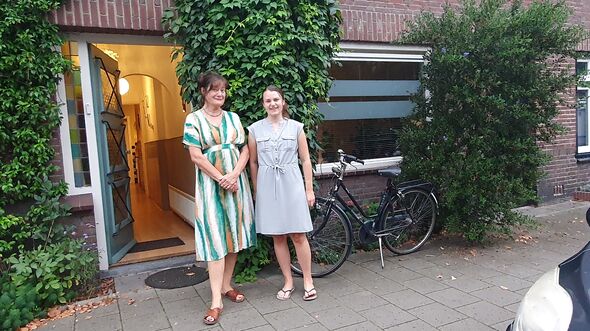
- Campus , Student
- 25/09/2023
First thirty students in Eindhoven find lodgings with hosts
Due to the severe room shortage, TU/e, Fontys, the Design Academy and the municipality of Eindhoven are promoting the so-called landlady regulation. Hospi Housing, a platform for hosted accommodation for both tenants and providers, has now successfully arranged the first thirty matches, but there are still at least 1,470 students on the waiting list.
In 2021, TU/e, together with other higher education institutions in Eindhoven, signed a new covenant in an effort to reduce the housing shortage for its students. The objective of this so-called Eindhoven Student Housing Covenant: “Our ambition is to achieve a greater balance between supply and demand by 2028. In order to fulfill this ambition, the covenant parties, based on the knowledge available in early 2020, aim to add a net total of 2,840 affordable units by 2028.”
Meanwhile, 456 rooms are now ready for student accommodation on Boschdijk in the former Philips main building, now called the VB building, and in March, housing corporation Woonbedrijf/Vestide completed 78 additional student residences, which were added to the existing complex of three hundred residences at the Berenkuil. In the summer of 2024, another 735 housing units will be added to the TU/e campus in the form of two new residential towers with low-rise buildings in between.
The covenant partners are working on additional projects to renovate potential buildings into student housing, but they cannot share many details yet because the contracts with the building owners have not yet been signed.
Hosted rentals
Another way of providing housing to students that educational institutions are exploring is hosted accommodation. They signed a contract with platform Hospi Housing to realize two hundred matches in Eindhoven by the end of 2024. TU/e, Fontys, the Design Academy and the municipality each invested a few thousand euros.
Hospi Housing was founded in Utrecht in 2019 by three former students. They made the link between their own experience with a host - abroad - and the room shortage in the Netherlands and started to help room seekers find accommodation with hosts or host families in Utrecht. The founders used the Covid-19 period to launch a professional online platform and then expanded rapidly. First they went to Leiden, Groningen and Nijmegen, and now the agency is active in every student city.
Cold feet
“Between 1,500 and 2,000 Eindhoven students have signed up for the accommodation service,” says co-founder Joost Bokkers, “and we have about a hundred providers. But there is still a vast potential of vacant rooms, especially in the Woensel district. Suppose that just one percent of the rooms were rented out; that could already fill the gap.” He estimates that there are three million vacant rooms in the Netherlands and over thirty thousand people looking for rooms. “In other cities, we see a lot of staff members of educational institutions serving as hosts and providers.”
Bokkers realizes that it will still be quite the challenge to match two hundred seekers and providers in Eindhoven within a year and a half. “We try to ease cold feet by showcasing the stories of others on our website. Our employees actively visit residential areas to hand out flyers, and we seek partnership with companies in the region and organizations such as senior citizen associations and community centers. We’ve taken the first crucial steps.”
ESA helps too
Jim Bergmans, policy officer at Education and Student Affairs (ESA), focuses on providing housing for international students. “This academic year, we received 1,300 applications from students from abroad for housing. Three-quarters of them are starting a bachelor’s program and a quarter a master’s program. For the first time, we were able to make all applicants a one-time offer that matches their stated personal budget. This is due to the opening of the VB building on Boschdijk. Currently 95 Dutch students and 361 international students are renting accommodation there. Cursor will be publishing an article soon about the integration between the two student groups.
Not all internationals accepted ESA’s offer. “Four hundred of them found something themselves or have decided against studying in Eindhoven,” Bergmans suspects. However, none of this changes the fact that the student room shortage remains severe here.
Snowball effect
Bergmans feels that the first 30 matches between hosts and tenants are the beginning of - hopefully - a snowball effect. “Positive stories create more awareness. Why wouldn’t a TU/e employee want to accommodate a student?” Maybe people are just apprehensive of the unfamiliar. “I think there is still a lot of uncertainty surrounding hosted rentals in terms of rights and obligations. Do I have to declare it for tax purposes (the first 5,800 euros per year is exempt, ed.), or am I still allowed to sell my house (a tenant has tenancy rights only after the first nine months, ed.)?” Bergmans himself will not be offering an empty room in his own house. “I live in Hilvarenbeek; that’s not very convenient. I do want to help but to be honest, I’m also reluctant to give up my privacy.”
More information from the municipality can be found here and if you are interested in Hospi Housing, you can click here.
“We feel a bit like aunt and niece”
Tiny Poppe, Communication Expertise Center employee, and Julie van Pagee, Biomedical Engineering alumna, have been living together as landlady and tenant for 5 years. How do they like it and do they have any tips for others?
In September 2016, student Julie van Pagee was looking for housing via Kamernet. She was not very demanding, but she was definitely not looking for a party house. “I saw ads of student houses that described their location in ‘number of tumbles away from the pub’. I’m a serious person, I want to be able to go to bed on time and have no obligations.”
On Kamernet, Pagee also came across three hosts offering rooms. She made appointments with all three. “I chose to rent a room from a 75-year-old landlady. She was very sweet and had a warm personality and I was given a beautiful attic room. Unfortunately, because of her age, she decided to sell her house and I had to leave.” In the first nine months, a host can terminate the contract without stating a reason.
By then, the BME student had already been in touch with TU/e employee Tiny Poppe, who was renting a room to a student Pagee knew through her Christian student association Emèt Qenee. When that room became available, all it took for a match was one brief conversation. Poppe: “We agreed on a few things. She prefers to shower in the evening, I in the morning. On weekends she goes to her family in Zeeland. I often use the kitchen earlier in the day than Julie. And she only cooks once a week and freezes three meals. We never get in each other’s way. It all works very smoothly.”
Poppe has been renting out a room in her home in Gestel since 2013. “When my son moved out of the house, I was left with extra space. I initially did it for financial reasons, but over time, it has become a familiar feeling to have someone in the house. It’s hard to describe, maybe this way of living together is closest to an aunt-niece relationship.”
A few tips from the host include: “Give each other space and agree on the time when it should be quiet in the house. For us, it’s 11 pm.”
“And express your expectations,” Pagee adds. Poppe remembers something else that is a prerequisite for successful cohabitation: “More important than your worldview is your daily rhythm. Julie is reformed, I’m atheist. But we can live under the same roof because we give each other space and respect each other.”

Discussion